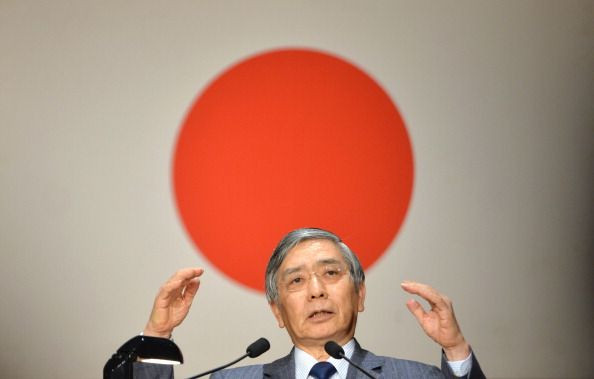Japan Rules Out Negative Interest Rates Ahead Of Rate Review, Yen Strengthens

Bank of Japan Governor Haruhiko Kuroda said Thursday that he is not thinking of adopting a negative interest rate policy now, indicating that the BOJ may look to expand its ongoing, massive asset-buying program.
Speaking at the Japanese parliament, Kuroda also said that the economy was recovering and the price trend was improving, while reiterating that he wouldn’t hesitate to act if needed.
"There are pros and cons of adopting negative interest rates ... The Federal Reserve didn't adopt negative interest rates and yet, its policy succeeded in stimulating the U.S. economy," he said, according to Reuters.
With a rate review meeting next week, Kuroda’s comments quelled speculation of a rate cut and the yen rose against most of the 31 Asian currencies -- as investors view the yen as a safe haven to park funds amid a broad downturn in stock markets.
“Kuroda not signaling any warning about current market turmoil sparked stock selling and the yen reversed course,” Yuji Saito, head of the foreign-exchange department at Credit Agricole SA in Tokyo, told Bloomberg. “All Kuroda needed to say was that he views markets with a considerable sense of tension.”
Kuroda also said that the recent rout in global stocks was among one of the risks to the country’s economic outlook but did not comment on the Japanese markets turning bearish Wednesday -- a sore point for many industry analysts who are looking for the government’s response to the situation.
The BOJ has kept monetary policy steady since expanding its massive stimulus program in October 2014. However, lower oil prices and reduced consumer spending has sent Japan’s inflation to almost zero -- a far cry from its 2 percent inflation target.
“The credibility of BOJ policy will likely take a hit” if the central bank doesn’t take additional action next week, Yuichi Kodama, chief economist at Meiji Yasuda Life Insurance, told the Wall Street Journal.
Investor concerns over Japan’s attempts to prop up inflation deepened after the BOJ in August pushed back its target date for achieving the 2 percent inflation to early 2017, without specifying any additional action. Kuroda, however, maintained at the time that the central bank’s policies were working and inflation was distorted by slumping oil prices.
© Copyright IBTimes 2025. All rights reserved.



















